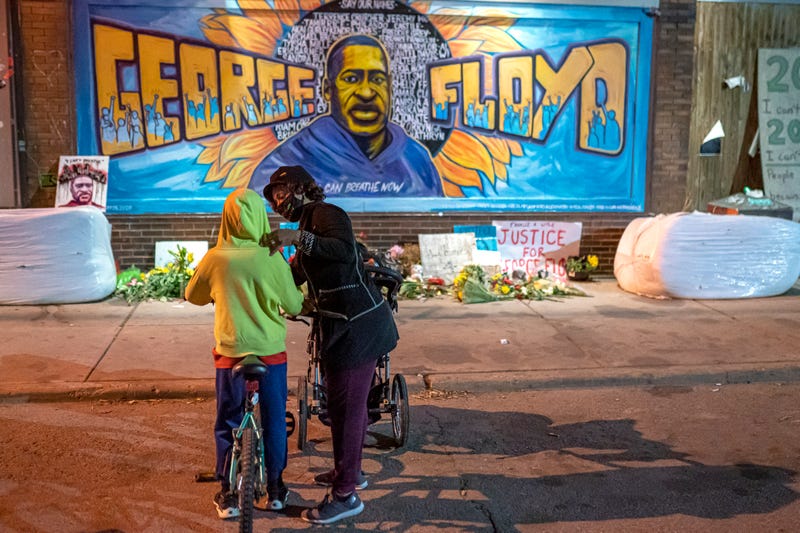
As the verdict was announced one week ago and former Minneapolis Police officer Derek Chauvin was found guilty of murdering George Floyd, the first reaction of many in the community was celebration or even relief that a measure of justice was served.
But outside of Minnesota, another effort toward justice is underway: a posthumous pardon for a 2004 drug case in Texas.
For a public defender, it was a nightmare scenario.
There was no reason to doubt the word of an experienced Houston Police Department Drug Task Force officer. The defendant was a Black man with prior convictions, including drug offenses.
The person representing Floyd in that 2004 drug case was faced with two options: plead guilty or go to trial, potentially risking Floyd being labeled a habitual offender and receiving a minimum sentence of 25 years.
Floyd pleaded guilty and served 10 months in a Texas State Jail facility.
More than 15 years later that officer, Gerald Goines, is disgraced, charged with multiple state and federal counts including murder after a botched no-knock warrant. Goines is accused of making up confidential informants to bolster his case, falsifying records, lying on an application for a search warrant and tampering with a witness.
The Harris County District Attorney identified dozens of people who may have been convicted on false evidence. There have been two exonerations. In 2019, a letter from the DA’s office was sent to a prior Houston address to notify Floyd that Goines was under criminal investigation.
Attorney Allison Mathis with the Harris County Public Defender's Office said it's possible Floyd was a victim of Goines, too.
“We know that he’s not a credible police officer, but we didn’t know that until pretty recently,” she said. “If George Floyd and George Floyd’s lawyer had the information that we have now -- that this police officer is a liar and he consistently and systematically set up, usually Black men, for small, lower-level drug offenses like this -- they probably wouldn’t have decided to plead guilty.”
Because Floyd is dead, the usual remedy of writ of habeas corpus is not available, which is why Mathis is attempting to secure just the second posthumous pardon in Texas history. The first and only was in 2010 when Gov. Rick Perry pardoned a man named Tim Cole who died in prison in 1999 for the 1985 rape of a Texas Tech University student. DNA evidence showed Cole was wrongfully convicted.
“I don’t think this (Floyd) conviction has integrity,” Mathis said. “And I think it’s important that since we have this spotlight in George Floyd right now, we highlight that this wasn’t an isolated event even in George Floyd’s life. Police brutality was not something that happened to him once. It was something that happened systematically to him throughout his life.”
Mathis’s 253-page application includes other interactions Floyd had with police in Texas. In 2001 when he was arrested for failing to identify himself when they suspected him of trespassing at an apartment complex when there was no report of a trespassing complaint. Or in his 2005 cocaine possession case in which an officer utilized Texas laws allowing motorists to be arrested for traffic violations to impound and search his vehicle without stating probable cause.
Former Hennepin County chief public defender Mary Moriarty knows Mathis from Gideon’s Promise training for public defenders and is helping Mathis secure driving records in Hennepin County to add to the application. Moriarty said there needs to be a legal or a cultural change within the criminal justice system to avoid situations like Goines’s.
“We give police officers so much leeway and so much power,” Moriarty said. “I’m not saying that most police officers abuse it but there are enough that we need to hold them accountable and we need not to give them so much leeway and so much power in certain types of cases.”
Public defenders are notoriously overworked and underpaid, but Mathis and Moriarty see this as a worthwhile endeavor.
“It’s not going to bring George Floyd back. Nothing is,” Mathis said. “But that doesn’t mean that we shouldn’t do something to honor his memory and make sure the record is as correct as possible about who he was as a person. Would you rather we didn’t do it at all? I don’t think so. I want to be on the right side of history as far as this is concerned and this is the right side of history.”
“When people think about him or look him up that’s not something that comes up,” Moriarty said. “What they think about is who he was and the people that cared about him and what he did in his life.”
The Texas parole board will offer a recommendation and Gov. Greg Abbott will decide.
LISTEN on the Audacy App
Sign Up and Follow Audacy
Facebook | Twitter | Instagram